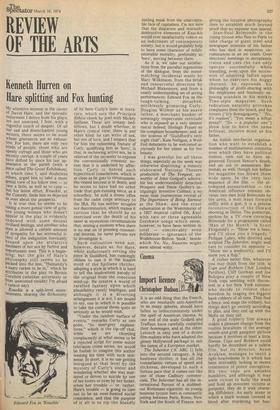Kenneth Hurren on Hare splitting and Fox hunting
My attentive interest in the career of David Hare, and the sporadic enjoyment I derive from his plays, are not unmixed, I fear, with a regretful touch of despair. Of all our sad and disenchanted young Writers, there seems to be none Whose grievances are so exhaustive. For him, there are only two kinds of people: those who are oPenly corrupt and those who are secretly corrupt. A couple of years have drifted by since his last appearance in the parish (with a Piece called The Great Exhibition), at which time I, and doubtless Others, urged him to take a more genial view of his fellow men — to care a little, as well as to carp — but his latest effort, Knuckle, at the Comedy, finds him as dejected as ever about the prospects. It is true that he seems to be taking a more genial view of girls: one young woman who doesn't appear in the play is evidently endowed with some decent civilised feelings, and another who does is allowed a certain amount Of sympathy for her sorrowful litany of the indignities inevitably heaped upon the attractive members of her sex by furtive and inlportunate men. This is a beginning; but the gist of Hare's Philosophy still seems to be Packed into the line, "Humanity's a nasty racket to be in," which he attributes in the play to Bernie Cornfeld (whether accurately or from unwonted timidity I'm afraid I cannot say). Knuckle is a split-level entertainment, sharing the dichotomy of its hero Curly's taste in literature, which sets the Principia Ethica cheek by jowl with Mickey Spillane. These are uneasy bedfellows, but I doubt whether, in Hare's cynical view, there is any other kind: he can write of sex, but not of love, and I suspect that for him the redeeming feature of Curly, qualifying him as 'hero', is that, in eschewing active sex, he is relieved of the necessity to express the conventionally romantic notion that it is underlaid by affection. Curly is denied such hypocritical consolations, which is as close as he gets to virtuousness. His vested interest is in death, and he seems to have had no other trade than gun-running since, as a schoolboy, he sold a dozen rifles from the cadet corps armoury to the IRA. He has neither scruples nor discrimination, which makes it curious that he should be so exercised over the death of his sister in mysterious circumstances that, seizing a, moment when there is no war on of pressing commercial interest, he turns private eye to investigate it.
Such curiosities need not, however, detain us, for Hare, while audaciously setting the piece in Guildford, has cunningly chccsen to cast it in the bizarre mold of the Spillane thriller, adopting a style in which it is hard to tell the inadvertent parody of the original from the conscious send-up. He creates a world of rarefied fantasy upon which plausibility rarely impinges, and although it is a diverting arrangement it is not,. I am bound to say, one in which it is possible to take the central thesis quite as seriously as he would wish.
"Under the random surface of events," remarks Curly at one point, "lie steel-grey explanations," which is the tip-off that, while we are chortling complacently at what seems to be a rejected script for some minor television crime series, we would be foolish to imagine this author wasting his time with such nonsense. In short, it is no use getting intrigued at that level by the mystery of Curly's sister and wondering whether she was murdered or driven to suicide by one of her lovers or even by her father, when her trouble — or, rather, Hare's trouble — is going to turn out to be an over-heated social conscience, and that the purpose of it all is to rip the blandly smiling mask from the unacceptable face of capitalism. I'm not sure that the disparate and mutually
destructive elements of Knuckle would ever satisfactorily cohere as
an indictment of contemporary society, but it would probably help to have some character of mildly estimable morality, preferably as 'hero', moving between them.
As it is, we take our satisfactions from the parodial ingenuities of the dialogue, from the moodmatching incidental music by Marc Wilkinson; from the brisk and resourceful direction by Michael Blakemore, and from a neatly understanding set of acting performances: Edward Fox as the
tough-talking, detached, mirthlessly grimacing Curly; Douglas Wilmer as his suave father, a merchant banker of seemingly impeccable rectitude who is exposed as a very sinister rascal indeed; Shelagh Fraser as his compliant housekeeper; and, as the hostess of "Guildford's only night club", Kate Nelligan, a West End debutante to be welcomed as joyously for her talent as for her beauty.
I was grateful for all these things, especially as the week was otherwise dispiriting: a messily elaborated National Theatre production of The Tempest, unworthy of John Gielgud's admirable but understandably detached Prospero and Denis Quilley's intriguingly inventive Caliban; a no more than journeyman revival of The Importance of Being Earnest at the Shaw; and the cruel exhumation at the Westminster of a 1927 musical called Oh, Kay! with two or three agreeable Gershwin songs which seem, however, to have been written in total — conceivably even deliberate — ignorance of the Wodehouse-Bolton 'book,' beside which No, No, Nanette might seem almost witty.


































 Previous page
Previous page